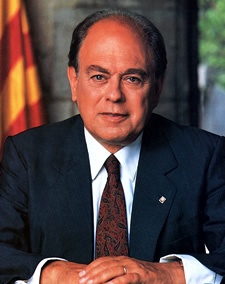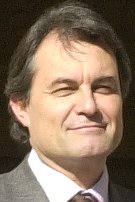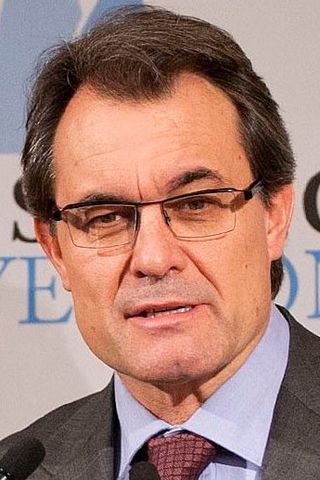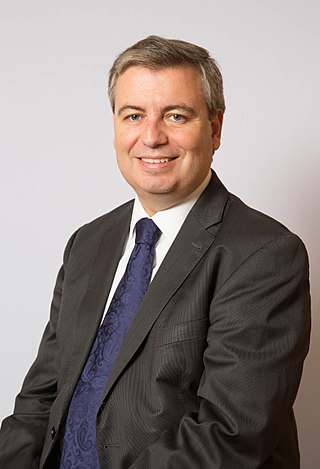The Republican Left of Catalonia is a pro-Catalan independence, social democratic political party in the Spanish autonomous community of Catalonia, with a presence also in Valencia, the Balearic Islands and the French department of Pyrénées-Orientales. It is also the main sponsor of the independence movement from France and Spain in the territories known as Catalan Countries, focusing in recent years on the creation of a Catalan Republic in Catalonia proper. Its current president is Oriol Junqueras and its secretary-general is Marta Rovira. The party is a member of the European Free Alliance.

Jordi Pujol i Soley is a retired Catalan politician who was the leader of the party Convergència Democràtica de Catalunya (CDC) from 1974 to 2003, and President of the Generalitat de Catalunya from 1980 to 2003.

Convergence and Union was a Catalan nationalist electoral alliance in Catalonia, Spain. It was a federation of two constituent parties, the larger Democratic Convergence of Catalonia (CDC) and its smaller counterpart, the Democratic Union of Catalonia (UDC). It was dissolved on 18 June 2015.

The Democratic Convergence of Catalonia, frequently shortened as Convergence was a Catalan nationalist, liberal political party in Catalonia (Spain), currently still existing without any political activity.
Pere Esteve i Abad was a Catalan Spanish politician, belonging to the political organisation Catalunya 2003, who became Deputy of Trade, Tourism and Consumer Affairs at the Catalan regional Government proposed by the Republican Left of Catalonia (ERC) party, with which he ran to the autonomic elections of the 2003. He resigned in October 2004 for health reasons.

The fifth government of Jordi Pujol was formed on 12 January 1996 following the latter's reelection as President of Catalonia by the Parliament of Catalonia on 16 December 1995 and his swearing-in on ?, as a result of the Convergence and Union (CiU) alliance emerging as the largest parliamentary force at the 1995 Catalan regional election, though managing to lose the absolute majority for the first time since 1980. It succeeded the fourth Pujol government and was the Government of Catalonia from 12 January 1996 to 29 November 1999, a total of 1,366 days, or 3 years, 10 months and 17 days

The fourth government of Jordi Pujol was formed on 16 April 1992 following the latter's reelection as President of Catalonia by the Parliament of Catalonia on 9 April and his swearing-in on 15 April, as a result of the Convergence and Union (CiU) alliance emerging as the largest parliamentary force at the 1992 Catalan regional election and securing a third consecutive absolute majority. It succeeded the third Pujol government and was the Government of Catalonia from 16 April 1992 to 11 January 1996, a total of 1,365 days, or 3 years, 8 months and 26 days.

The 2003 Catalan regional election was held on Sunday, 16 November 2003, to elect the 7th Parliament of the autonomous community of Catalonia. All 135 seats in the Parliament were up for election.
The politics of Catalonia takes place within the framework of its Statute of Autonomy, which grants a degree of self-government to Catalonia and establish it as an autonomous community of Spain with the status of a nationality, operating as a parliamentary democracy. The Generalitat de Catalunya is the Catalan institution of self-government, which includes the Parliament of Catalonia, the President and the Executive Council. The Parliament of Catalonia is one of the oldest in the world.

The 1999 Catalan regional election was held on Sunday, 17 October 1999, to elect the 6th Parliament of the autonomous community of Catalonia. All 135 seats in the Parliament were up for election.

José Montilla Aguilera is a Spanish politician who is currently a member of the Spanish Senate. He was the 128th President of Generalitat de Catalunya. He became the First Secretary of the Socialists' Party of Catalonia on 18 June 2000, and a member of the Federal Executive Committee and the Federal Committee of the Spanish Socialist Workers' Party (PSOE) on 23 July 2000. He served as Minister of Industry, Tourism and Trade in the government of José Luis Rodríguez Zapatero from 18 April 2004 until 9 September 2006. He is married and has five children. On 29 November 2010 he announced he would not stand again for the post of First Secretary of the PSC due to his party's having obtained its worst-ever results in the 2010 election.

Xavier Trias i Vidal de Llobatera is a Spanish politician, member of Together for Catalonia and was Mayor of Barcelona from July 2011 to June 2015. Among other responsibilities to the Government of Catalonia, he was Minister of Health and of the Presidency for various Jordi Pujol Governments.

The 1995 Catalan regional election was held on Sunday, 19 November 1995, to elect the 5th Parliament of the autonomous community of Catalonia. All 135 seats in the Parliament were up for election.

The 1988 Catalan regional election was held on Sunday, 29 May 1988, to elect the 3rd Parliament of the autonomous community of Catalonia. All 135 seats in the Parliament were up for election.

The 2012 Catalan regional election was held on Sunday, 25 November 2012, to elect the 10th Parliament of the autonomous community of Catalonia. All 135 seats in the Parliament were up for election. It was a snap election, announced on 25 September by President Artur Mas following the pro-independence demonstration in Barcelona on 11 September—the National Day of Catalonia—and the failed talks between President Mas and Prime Minister Mariano Rajoy to give greater fiscal autonomy to Catalonia.

The 2015 Catalan regional election was held on Sunday, 27 September 2015, electing the 11th Parliament of the autonomous community of Catalonia. All 135 seats in the Parliament were up for election. This was the third regional Catalan election in only five years, after the 2010 and 2012 elections and the first one in over 37 years in which Democratic Convergence of Catalonia (CDC) and Democratic Union of Catalonia (UDC) ran separately, after the dissolution of Convergence and Union (CiU) in June 2015 over disagreements on the coalition's separatist turn.

The Democratic Reformist Party was a Spanish political party led by Miquel Roca founded in 1983. It was supported by the Liberal Democratic Party (PLD) of Antonio Garrigues Walker, the Riojan Progressive Party (PRP) and the Majorcan Union. It was known as "Operation Roca", referring to its main leader and candidate for Prime Minister, Miquel Roca i Junyent. The party ran in all of Spain, with the exception of Galicia, where it was represented by Galician Coalition (CG), and Catalonia, where its representative was Convergence and Union (CiU).

The 1984 Catalan regional election was held on Sunday, 29 April 1984, to elect the 2nd Parliament of the autonomous community of Catalonia. All 135 seats in the Parliament were up for election.

The 1980 Catalan regional election was held on Thursday, 20 March 1980, to elect the 1st Parliament of the autonomous community of Catalonia. All 135 seats in the Parliament were up for election. This was the first regional election to be held in Catalonia since the Spanish transition to democracy and the second democratic regional election in Catalan history after that of 1932.

Jordi Xuclà i Costa is a Spanish lawyer, academic and politician from Catalonia. He is a former member of the Congress of Deputies of Spain and the Senate of Spain.













